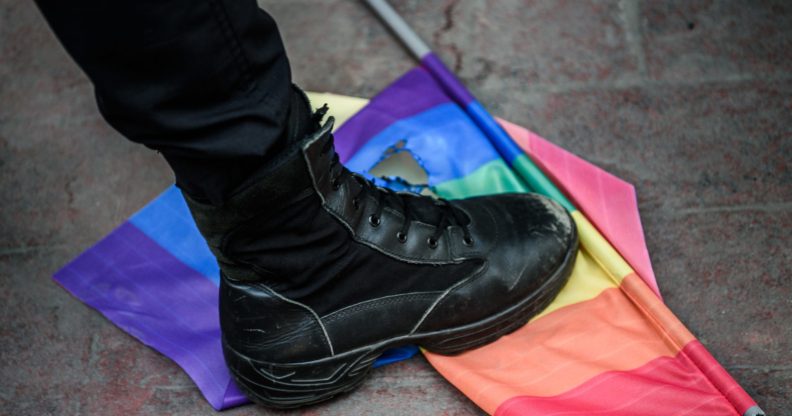Turkey claims rainbows ‘negatively affect children’s mental health’ in chilling clampdown on LGBT+ Pride merchandise

A Turkish anti-riot police officer steps on a rainbow flag during a rally staged by the LGBT community on Istiklal avenue in Istanbul on June 19, 2016. (OZAN KOSE/AFP via Getty Images)
In Turkey, government advertising regulators have announced that LGBT+ and rainbow-themed products sold online must be advertised as being for ages 18 and over to “protect children”.
Board members of the Reklam Özdenetim Kurulu, which operates within the Ministry of Industry and Commerce, “unanimously” agreed that not listing the wares with an 18+ warning risks children’s “mental, psychological and social development”.
The board, whose members stretch across other government departments such as health and justice, stressed in a letter seen by BBC Turkish that the agency is not banning LGBT+ items.
Rather, it instructs that selling the merchandise without a warning “constitutes a violation of the legal regulations”, read the letter, signed by Oğuz Şahin, a deputy general manager at the Ministry of Commerce.
He noted that companies that do not rate rainbow goods as 18+ will see advertisements suspended.
The letter stated: “In this context, e-commerce platforms, which are widely used by consumers throughout the country, should be sensitive to this issue and I request your information to take the aforementioned measures.”
Turkey claims rainbows ‘negatively affect’ children.
Ministry sources told BBC Turkey that it was a “decision to protect children”.
“Considering that there are regulations by the Advertising Board on advertisements that are intended for children and that are likely to affect children, direct exposure of children to advertisements of such products may negatively affect the mental, psychological and social development characteristics of children,” they added.
The twin backbone of the new rule will be a pair of clauses in Article 24 of Turkey’s 2015 Regulation on Commercial Advertisement and Unfair Commercial Practices, the letter said.
One clause states products targeting children cannot contain images or messages that would “negatively affect the physical, mental, moral, psychological and social development characteristics of children.” A second states they also “cannot contain elements to disrupt, change or denigrate cultural, moral and positive social behaviours”
In Turkey, the sight of tear gas, water cannons and plastic riot shields squelching Pride events in Istanbul has become a regretful annual tradition.
The country’s president, Recep Tayyip Erdoğan, as well as lawmakers, religious leaders, heads of major humanitarian agencies and even clothing retailers have launched vicious attacks against the country’s embattled LGBT+ community.
Retail giant LC Waikiki announced earlier this year that it will ban rainbows, unicorns and other “LGBT+ images” from being used in its clothing designs.

